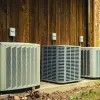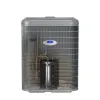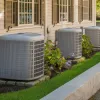Sooner or later, it happens.
Your HVAC technician swings by for a maintenance inspection and finds a part that needs to be replaced. This time, it’s a big battery-like thing. He says it’s called a capacitor. He says it needs to be replaced.
Does it?
All AC and heat pump capacitors fail eventually.
Capacitors are one of the most common parts that need to be replaced on residential air conditioning systems. They typically provide several years of service, but you’ll need to replace them at least once if you keep the same air conditioner for more than ten years.
Your system might have one or more capacitors. In many outdoor units, there’s a start capacitor, which helps the AC get going when there’s a call for cooling. There’s also a run capacitor, which keeps the system going after it starts up. However, your system might just have one capacitor in the outdoor unit, and certain models even have a capacitor for the indoor blower motor.
Capacitors do look like big batteries, but they connect to wires inside your air conditioning system. Unfortunately, you can’t just pop a capacitor into a slot and close a plastic cap. So, it’s not the same thing as a battery.
Please don’t try to replace your capacitor yourself.
Anyone is free to write down the capacitor size for their system, buy another one online, and install it. However, we recommend not doing that.
Capacitors can be dangerous. Even after you disconnect the power to the AC, the capacitor still holds a lot of charges. If you touch it, it might electrocute you. And it can hurt you badly.
Just ask the UC-Berkeley employee who got zapped by a capacitor while replacing a cooling fan. Capacitors can send you to the emergency room if you’re not sure what you’re doing.
HVAC techs know how to handle capacitors. It’s best to let them do their thing.
So, how do you know you need a new capacitor?
Your HVAC guy says your capacitor is on the fritz. Here’s how you know he’s right:
- The voltmeter says there are too few microfarads. All capacitors are rated in microfarads. For example, yours might be rated for 35 microfarads with a range of plus or minus 10. If it dips below 25, a voltmeter will tell your HVAC technician that it’s time to replace it.
- It’s swollen like a balloon. When the capacitor is far gone (and by the time we find them, they often are), it will swell up. Your capacitor might be bad even if it isn’t swollen, but it’s common for a bad capacitor to swell. It will look like someone packed too much material into the tube and it’s bulging at the sides.
- The capacitor leaks oil. This doesn’t always happen, but bad capacitors frequently have oil leaking out of them. A leaky capacitor = a capacitor that’s past its prime.
And there you go! That’s how you know you need a new AC capacitor.
Sometimes, an old, rusty-looking capacitor will still read at the appropriate level of microfarads. It comes down to the voltmeter reading, physical swelling, and/or the presence of oil.
Know when we’re most likely to find a bad capacitor?
There are two times. The first is when your AC quits and you’re sweating like crazy inside your home. Something is the matter and, lo and behold, it’s the capacitor. After we replace it, the AC runs again.
The other time – and this is what you want to happen – is during our cooling season maintenance inspection. Clients with service agreements get these inspections every year (there are two per year, although we only check AC capacitors on one of them), and we always check the capacitors while we’re on site.
There are two reasons why it’s better to replace a bad capacitor during a routine maintenance inspection:
- We probably caught the bad capacitor before it stopped working completely. So, you’re not without any AC in the meantime.
- You’ll get a big discount on the new capacitor.
If you’ve got a service agreement and we’re already at your home to do an inspection, we’ll replace a bad capacitor at a 15% discount – that’s on top of the 15% parts discount we already offer as part of the agreement.
We can’t provide that discount if we’re called out to fix a non-working AC and have to replace a capacitor. But if you’ve got a maintenance plan and we catch the bad capacitor during a routine tune-up, that savings is one of the benefits you enjoy.
Now you know what to ask about the next time an HVAC tech says the capacitor needs to be replaced.
And if you live in Metro Atlanta and your air conditioner is acting up, give us a call! Someone from our team will identify the problem and point you to the best possible long-term fix.






